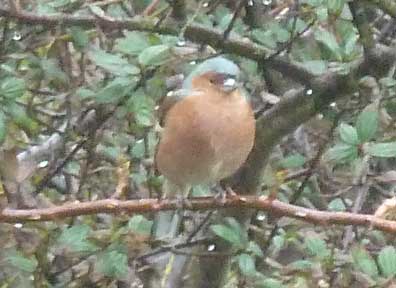The Round Hill Society
The home site of the Round Hill Society, a community group of the residents of Round Hill in Brighton, England. The site contains information about the area, latest news and reflections on life in Round Hill.
Spring has nearly sprung
by Jan Curry Round Hill Reporter" March 2005
SPRING HAS NEARLY SPRUNG...

...but not yet - I’m sure we are due for a few days of hard weather soon.
This is a really difficult time of year for birds such as chaffinches and greenfinches. They are seed eaters and there are so few seed heads left on plants at this time, they need all the help they can get. A seed feeder hanging outside a window, encouraging the birds to come close, is almost as good as television; even better sometimes.

I - no, who am I kidding - my husband has just checked and cleaned out the fifteen bird boxes in our garden (I held the ladder). Twelve of them had obviously been previously occupied, as they still contained neat nests. These should be removed so a new family moving in can begin afresh: no bugs, germs, broken egg shells or dead baby birds to put them off. If there were enough natural places for them to nest, winter winds and rains would have destroyed even the most cleverly constructed ones by now; enclosed bird boxes have to be done by hand. January is a bit late really – we should have completed the job before Christmas, as the birds are beginning to look for likely nesting places already. Many of them will have paired up by Valentine’s Day.
Back to those chaffinches, who prefer to build their own nests. I have just read: ‘...she will find a suitable branching shrub or tree and will make a secure foundation by wrapping round the twigs with strands of spiders’ webs. She will then add moss and grass to make a firm base. The bird will then work more material in place before she sits down and wiggles around to form the cup shape. Then she will stamp around a bit until all the materials become felted together. All this work, all this activity, but if she has two broods in one season, she will set to work to make a fresh one.’ (RSPB)
When we first moved here nearly fifty years ago, the back gardens along Richmond Road had dozens of finches flitting around. Now there are only a few. Why is that, I wonder? Not enough shrubs, too few seeds, not many spiders, too many slug tablets I guess.
This page was last updated by Ted on 09-Nov-2013SPRING HAS NEARLY SPRUNG...

...but not yet - I’m sure we are due for a few days of hard weather soon.
This is a really difficult time of year for birds such as chaffinches and greenfinches. They are seed eaters and there are so few seed heads left on plants at this time, they need all the help they can get. A seed feeder hanging outside a window, encouraging the birds to come close, is almost as good as television; even better sometimes.

I - no, who am I kidding - my husband has just checked and cleaned out the fifteen bird boxes in our garden (I held the ladder). Twelve of them had obviously been previously occupied, as they still contained neat nests. These should be removed so a new family moving in can begin afresh: no bugs, germs, broken egg shells or dead baby birds to put them off. If there were enough natural places for them to nest, winter winds and rains would have destroyed even the most cleverly constructed ones by now; enclosed bird boxes have to be done by hand. January is a bit late really – we should have completed the job before Christmas, as the birds are beginning to look for likely nesting places already. Many of them will have paired up by Valentine’s Day.
Back to those chaffinches, who prefer to build their own nests. I have just read: ‘...she will find a suitable branching shrub or tree and will make a secure foundation by wrapping round the twigs with strands of spiders’ webs. She will then add moss and grass to make a firm base. The bird will then work more material in place before she sits down and wiggles around to form the cup shape. Then she will stamp around a bit until all the materials become felted together. All this work, all this activity, but if she has two broods in one season, she will set to work to make a fresh one.’ (RSPB)
When we first moved here nearly fifty years ago, the back gardens along Richmond Road had dozens of finches flitting around. Now there are only a few. Why is that, I wonder? Not enough shrubs, too few seeds, not many spiders, too many slug tablets I guess.